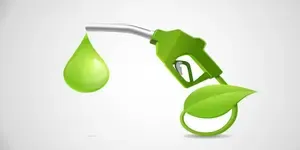Does Ethanol-Blended Petrol Offer Better Acceleration and Ride Quality?

Synopsis
Key Takeaways
- E20 fuel improves acceleration and ride quality.
- It reduces carbon emissions by approximately 30% compared to E10.
- E20's higher octane number is beneficial for modern engines.
- Concerns about mileage are often misplaced; many factors influence fuel efficiency.
- Vehicle insurance remains valid with E20 fuel usage.
New Delhi, Aug 12 (NationPress) The Ministry of Petroleum and Natural Gas affirmed on Tuesday that the introduction of 20 percent Ethanol Blended Petrol (E20) enhances acceleration, improves ride quality, and reduces carbon emissions by roughly 30 percent compared to E10 fuel.
The announcement aimed to dispel concerns regarding fuel mileage and vehicle longevity, emphasizing that ethanol's elevated octane number (approximately 108.5 in contrast to petrol's 84.4) positions ethanol-blended fuels as an advantageous option for high-octane needs, which are essential for contemporary high-compression engines. Vehicles optimized for E20 exhibit superior acceleration, a critical aspect in urban driving scenarios. Moreover, ethanol’s increased heat of vaporization lessens intake manifold temperatures, enhancing air-fuel mixture density and improving volumetric efficiency, the statement elaborated.
Additionally, it is significant to note that Brazil has been utilizing E27 for many years without any complications. The same manufacturers, including Toyota, Honda, Hyundai, etc., also produce vehicles there, the statement highlighted.
“The issues regarding performance and mileage that are currently being raised were predicted by the government as early as 2020. An Inter-Ministerial Committee (IMC) of the NITI Aayog scrutinized these concerns extensively. This was further supported by research conducted by Indian Oil Corporation, ARAI, and SIAM,” the statement added.
Previously, petrol in India had a Research Octane Number (RON) of 88. Currently, regular petrol has an RON of 91 to align with BS-VI standards aimed at minimizing harmful emissions. This has been further enhanced to RON 95 with the blending of Ethanol 20, yielding improved anti-knocking traits and performance, according to the statement.
The assertion that E20 results in a “drastic” decrease in fuel efficiency is fundamentally flawed, as vehicle mileage is affected by numerous factors beyond just the fuel type. These factors encompass driving habits, maintenance practices like oil changes and air filter cleanliness, tire pressure and alignment, as well as air conditioning load, it mentioned.
In-depth discussions have taken place with the Society of Indian Automobile Manufacturers (SIAM) and key vehicle manufacturers. Any efficiency decline in E10 vehicles has been minimal. For some manufacturers, vehicles have been compatible with E20 since 2009. Therefore, concerns regarding efficiency drops in these vehicles are unfounded, the statement clarified.
The initiative of Ethanol Blending is a national effort. Some individuals attempt to undermine it by instilling fear and confusion among car owners through selective information and misleading narratives suggesting that insurance companies will not cover damages arising from E20 fuel use. This fear-mongering is completely unfounded, as clarified by an insurance company whose screenshot tweet was misinterpreted to generate panic. The utilization of E20 fuel does not affect the validity of vehicle insurance in India, the statement asserted.
Reverting to E20 petrol would mean sacrificing the significant progress made in pollution control and the achievements in energy transition, the statement noted. The IMC's roadmap has been publicly accessible since 2021, outlining a measured approach towards achieving E-20. With over four years of preparation, vehicle technology has advanced, the supply chain has been optimized, and a comprehensive ecosystem has been established, as stated.
Furthermore, safety standards for E20 are well-defined by BIS specifications and Automotive Industry Standards. In most criteria, including drivability, startability, metal compatibility, and plastic compatibility, there are no significant concerns. Only in the case of specific older vehicles may some rubber parts and gaskets need earlier replacement than when using non-blended fuel. This replacement is cost-effective and easily managed during routine maintenance, potentially required only once throughout the vehicle's lifetime and is a straightforward procedure at any authorized workshop, the statement conveyed.
The statement noted that some have expressed that ethanol-blended petrol should be less expensive than non-blended fuel, and that this cost benefit has not been transferred to consumers, referencing a NITI Aayog report. In 2020-21, when the report was compiled, ethanol was less costly than petrol. However, over time, the procurement costs for ethanol have risen, and currently, the average price of ethanol exceeds that of refined petrol.
Despite the rising ethanol prices compared to petrol, oil companies remain committed to the ethanol blending mandate, as the program bolsters energy security, supports farmers' incomes, and contributes to environmental sustainability.
Meanwhile, automobile manufacturers are actively engaging with vehicle owners to offer any necessary support to ensure optimal vehicle performance. Vehicle owners believing their vehicles may need additional tuning or parts replacement can access the entire network of authorized service stations for assistance.
Concerns persist regarding whether the nation will advance beyond E20 rapidly, the statement indicated, adding that any progression beyond E-20 necessitates meticulous calibration, which is currently under extensive consultations. This process involves the same vehicle manufacturers already operating in Brazil, along with other manufacturers, feedstock suppliers, R&D agencies, oil companies, and ethanol producers.
This process has not yet reached a conclusion.
Currently, the government's roadmap commits to E20 until October 31, 2026. Decisions beyond this date will depend on the IMC's report submission, evaluation of its recommendations, stakeholder consultations, and a thoughtful government decision in this regard. Such a decision is still pending, the statement concluded.









